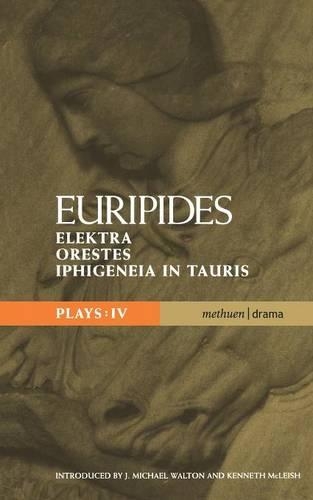
Euripides Plays: 4: Elektra; Orestes and Iphigeneia in Tauris
(Paperback)
Available Formats
Paperback
Published: 1st August 2006
Paperback
Published: 1st August 2006
Paperback
Published: 1st August 2006
Paperback
Published: 1st August 2006
Publishing Details
Euripides Plays: 4: Elektra; Orestes and Iphigeneia in Tauris
By (Author) Euripides
Translated by Kenneth McLeish
Bloomsbury Publishing PLC
Methuen Drama
1st August 2006
United Kingdom
Classifications
Tertiary Education
Non Fiction
882.01
Physical Properties
Paperback
224
Width 111mm, Height 178mm, Spine 14mm
256g
Description
"Euripides, the Athenian playwright who dared to question the whims of wanton gods, has always been the most intriguing of the Greek tragedians. Now, with translations aimed at the stage rather than the page, his restless intellect strikes the chord
This volume contains some of Euripides' most famous works: Elektra, which reverses previous notions of 'heroic' behaviour; Orestes, in which almost all the characters are driven by base motives of cowardice or revenge; Iphigeneia in Tauris who presumes her brother Orestes dead and her mother Klytemnestra and stepfather Aigisthos still living, is visited by a surprise guest.
Elektra, Oresetes and Iphigeneia in Tauris were performed together as Agamemnon's children at The Gate Theatre in 1995 and show the consequences of Agamemnon's "sacrifice" of his daughter at the start of the Trojan war.
Author Bio
One of the greatest and most influential of the Greek tragedians, Euripides, is said to have produced 92 plays, the first of which appeared in 455BC. Kenneth McLeish studied Classics and Music at Worcester College, Oxford. Once a full-time translator, author and dramatist, he published extensively including The Good Reading Guide, Shakespeare's People, The Theatre of Aristophanes, Companion to the Arts in the Twentieth Century, Myth, The Listener's Guide to Classical Music and Crucial Classics (both with Valerie McLeish) and The Bloomsbury Guide to Human Thought (as general editor). His original plays and his translations - from ancient Greek drama, as well as from Strindberg, Ibsen Moliere and Strindberg - have been widely performed, most notably by the National Theatre and the Royal Shakespeare Company.
